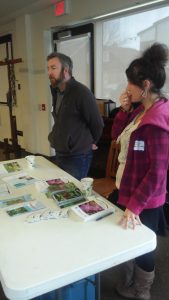You missed the workshop on creating your Monarch award-winning garden (for gardens nature loves, by gardeners who love nature)?. No problem, we’ve got you covered. Here’s what happened.
Soil
After an introduction about what we’re looking for in a Monarch award-winning garden, Charlie Briggs of RBG went on to advice about the importance of a healthy soil and what that looks like.
“It’s the start of a whole system,” Charlie explained, “and it should provides the necessities for plants and animals to live. As well, it should allow water penetration for proper water table recycling.”
For these, you’ll be checking out the following: Texture, pH (potential of Hydrogen), nutrient content, and water retention and drainage.
With soil texture, you have to decide what type you have, that is, sand, silt or clay. Note that the soil texture could differ by depth of soil and also by location in the garden. For the pH, you can use a soil test kit. For more information, Charlies suggests the OMAFRA list of soil testing laboratories.
Having to amend soil can be a big hassle, but if needed, Charlie recommends that you can do so with organic matter. You can start your own compost, or purchase or receive compost/organic matter from trusted sources (e.g. City of Hamilton). Equally important is to mulch your garden with leaf and other plant litter. This will break down into a fine organic layer as well as provide other benefits to your garden.Charlie advises that you add organic matter by tilling into a large area or garden, not by amending single holes for trees or shrubs! Be sure to select plants for your soil type, and choose the right plant for the right place! Carolinian Canada has a selection of plants for almost every soil type.
We’ll be looking for those gardens that provide for our native plants and animals, and allow as much rainwater to fulfill its cycle on site. The garden can have different types of soil showcasing proper plant selection.
Water
For the water component of a garden that supports nature, we were fortunate to have both Kestrel Wraggett, Stewardship Technician with Cootes to Escarpment and Jeff Stock, Stewardship Technician, Hamilton Conservation Authority to explain Low Impact Development (LID) towards more natural water infiltration levels. Do you have a rain barrel? And is it being maintained properly (that is, is the downspout disconnected)? Some ways that you can preserve water and keep it out of the sewer is to disconnect your downspout and lead direct the water to create a soakaway or a rain garden! Is your lawn naturalized? Driveway permeable?Abiotic Components
Master gardener Joanne Tunnicliffe explained that the biotics can’t be as successful in your garden if you don’t have the abiotic (the non-living parts of an ecosystem). They need the warmth, shelter, food, and spaces to reproduce. Without the right amount of sunlight or moisture, for example, some plants are unable to survive. Success happens when the biotic moves in the abiotic. Joanne showcased examples of recycled toys that can be used for shelter and nesting grounds.
Native Plants
Claudette Sims and Janet Hughes-Mackey with Halton Master Gardeners talked about the rewards that flowers receive (the pollinators come), making sure you plant the flowers en masse, make sure you use native species, and that you plant for shelter in mind and host plants. For example, plant so that you extend the nectar sources for different times of years, from May to November.Check out Claudette’s awesome blog post on what to plant in your garden.
Following these brief presentations, the experts each took a corner of the room and participants were invited to head over with their questions pertaining to their topic of interest.
As Bev Wagar (the brains behind the Monarch Awards) reminded us, “remember that you are doing right by the neighbourhood. Your gardening style is diversity.” Change the old ways of doing things, look for functional things that make a huge difference.
Thanks to Elizabeth Seidl for gathering these quotes from some of the attendees as to what they expected to get out of the workshop:
I’m hoping to start a pollinator garden at home. My goal is to create a garden that will attract wildlife and is low maintenance and I would like to use a rain barrel. I’m also considering an herb garden that is aesthetically pleasing with a variety of useful edibles which can also be used for educational purposes. Learning about abiotic habitat has made me consider what else I can incorporate in my garden –like bee boxes and water sources.–Erin Mallon
I’m here today to augment my knowledge. I have a pollinator garden at home. I feel it’s important to have a naturalized garden at home; my home borders a park on three sides. I have experience with the usual native plants, but my favourite is Joe Pye Weed, I just love the story behind the name, its height and that it’s easy to grow. –Joanne Ballarano
I’m hoping to learn more about how to eliminate invasives and for knowledge of shade plants, I have a tulip tree that has grown up and my garden is transitioning. My garden has won a North American Native Plant Society award. With native plants it’s all about the arrangement – some of m y favourites are Joe Pye, Bee Balm (for its tea), Bloodroot, Pearly Everlasting, the Paw Paw tree.-Angelique-Marie Mori
I would like to get an idea of what to do in my backyard. It’s a blank slate and has more sun than before. I would like to try more rain barrels and the idea of a rain garden is very appealing. Food producing shrubs with berries and vertical gardens are also interesting to me.-Anne Vallentin
I’m looking for inspiration and ideas for plantings. I have some issues with sight lines in my front yard but there are utility boxes that I would like to minimize with a garden of low maintenance perennials or some low shrubs.-Dianne
We hope you all got what you wanted out of the workshop! Remember to get your application in by the June 18th deadline. Go to https://monarchawardshamilton.org/ for details.
The awards are now open to wards 1-10 and 13. Good luck!





